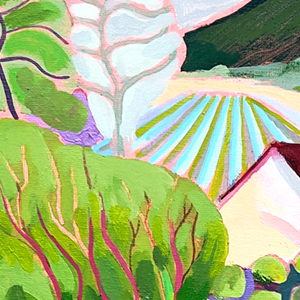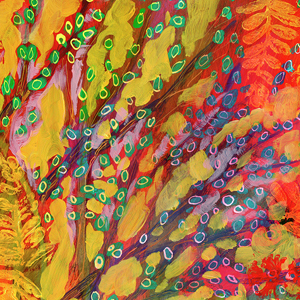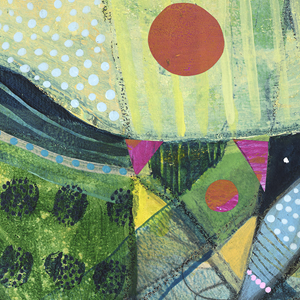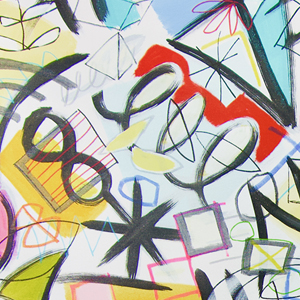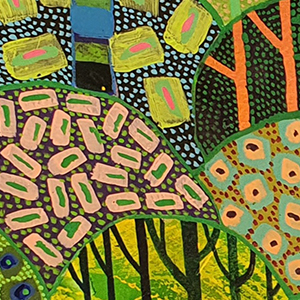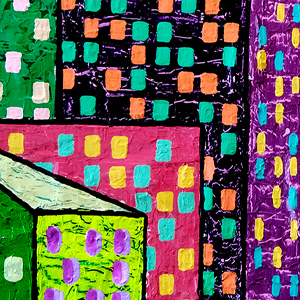
Abundant Virtue
Generosity, Hospitality & the Good
Melissa Fitzpatrick
Artwork: “Let All the Good Things Flow” by Tracy Verdugo © 2020
I would bet that many of us who have dealt with severe emotional or physical pain have been fortunate enough to understand the healing quality of generosity.
Generosity in the form of an attentive caregiver, ready and willing to effectively tend to whatever turn our ailment takes; generosity in the form of gracious ears, radically open to listening to what troubles us; generosity in the form of carefully crafted remedies that someone, who has already benefitted from them, is eager to pay forward; and of course, generosity in the form of the gift of ostensibly unlimited time and space from someone who is able to find us in our pain and help us feel seen, cared for, and loved.
I recently injured my back for the first time in my life—it was debilitating at a level I have never experienced before. I was humbled, to say the least, and after describing the injury to a dear friend of mine (who also happens to be my neighbor), within minutes, she was at my front door with every back pain-related remedy you could possibly imagine (and a homemade oatmilk latte to boot). The generous gesture alone eased my nervous system and alleviated, ever so slightly, the pain that was plaguing me. How extraordinary. And what seemed to give her generosity its alleviating quality was the immediate, uncalculated tune of her giving. Above all, her unconditional willingness to host my pain—her willingness to both hear and see me in my vulnerability and assure me that I was not alone in my discomfort. This is generosity as an unconditional gift, as radical hospitality, as absolute goodness.
My fiancé walked by a café near our apartment and noticed that there was an unhoused gentleman sitting at a bench in the entry way. When a family walked past him to enter the café, the man quickly hung his head down in what appeared to be an attempt to disappear, in shame, from the public eye. When my fiancé told me about this, I realized that I knew the man he was talking about; a man who regularly sweeps the sidewalks and picks up trash by the beach. He is particularly respectful and kind, regularly wishing those who are willing to make eye contact with him a wonderful day. We started talking about what we could or should do to help him, what we could give him. Should we put together a care pack and bring it to him? Or should we ask him what he needed and then buy it for him? Should we just give him whatever cash we had on hand? Or take out money for him? Should we start by simply asking him what his name is, so that he could feel seen as a part of our community?
Mulling over these questions, we then asked (as two philosophers) the difficult, moral question of at what point the giving ought to stop. Is it at $20 or $200? Is it at regularly feeding him? Giving him blankets and a better tent? Is it inviting him in for something to eat or drink? Letting him take a shower? Then we felt a bit ashamed of ourselves, recognizing that the generous impulse we had was slowly being leveled by conditions. What is the appropriate amount to give a stranger? At what point do you stop giving? Should you ever stop giving?
I will never forget the day that the gentleman asked me if I happened to have a cigarette, assuming I did not have one—and he was correct. When I walked away, I regretted not asking him for his name or striking up a more substantial conversation, so I decided to run into our apartment, grab the cash we had on hand, and give it to him. When I handed him the money, he asked me my name, smiled sincerely, and thanked me, repeating my name multiple times to make sure he remembered it. I finally asked him for his name, too. Larry. And a deep warmth filled my heart from the simple yet profound exchange.
What is generosity? And what does it mean to be generous?
Generosity, hearkening back to Aristotle, is the moral virtue that is the “mean” or middle path between stinginess or frugality and wastefulness or extravagance, meaning there is a calculated measure on precisely how much one should give, given the circumstances. It should not be an exorbitant amount, but it should also not be nothing. The specific quantity is contingent on the context; given the resources one has and the needs of the other, there is an appropriate amount (of time, love, care, money, hosting, etc.) that one should give. This conditional calculus is helpful at a practical level, providing a means of answering the pesky question of how much we should give and when we should stop giving. But there is also something about this way of thinking about generosity that is a bit unsettling and seems to miss a dimension of the profound healing quality that unconditional generosity provides not only to the one in the need, but also in one who is doing the giving. The beautiful, therapeutic, and awe-inspiring quality that accompanies both giving and receiving an utter outpouring of care, expecting nothing in return.
Though he uses the term rather infrequently, one of the great thinkers on generosity is 20th-century philosopher Emmanuel Levinas. Levinas’s philosophical project seeks to invert our understanding of who we most essentially are, from beings who impose our will upon the world to beings who, first and foremost, respond and are responsible for what it beyond ourselves. This is, as he describes it, the original goodness of creation: being-for-the-other(s), refusing to approach the other with empty hands. For Levinas, the “moral law” is not a principle that one ought to obey or some form of calculated altruism but is instead the ontological understanding that I am the other(s) when I myself most fully am: we are all co-constituted by each other. One might think of the Bantu word, ubuntu, as the perfect expression of this. Signifying ‘humanity’, ubuntu encapsulates the idea that “I am because we are” or “I am because you are.”
One of my favorite quotes from Levinas is that “the good is not presented to freedom; it has chosen me before I have chosen it. No one is good voluntarily.”1 This means that the good is not a choice, but something that has already seized me. It grounds my existence. I am always and already called to host the others, wholly responsible for them.
Levinas also describes the good as the extraordinary forgetting of death. What he means by this is that embodying goodness involves somewhat imprudently losing all sense of concern for ourselves (that is, our perpetual drive toward our own self-preservation or self-care) in an unconditional concern for the other. Of course, “death” need not be taken literally here. It rather refers to the divestment or letting go of the ego: letting go of “me” and my never-ending list of things to do. It is the readiness to completely sacrifice oneself for the other, as host, unreservedly welcoming the other—the widow, the orphan, the stranger, and the poor—as guest. Levinas also describes this letting go of the ego as God’s announcement to Abraham: here I am. As Levinas puts it, “to respond with responsibility: me, that is, here I am for the others.”2 Responsibility is listening, in hospitality, to the other in need. This radical generosity—the most profound form of hospitality—is an outpouring of love, providing shelter, food, and care for the others. It involves taking the (actual and metaphorical) bread out of one’s mouth for the other to eat. By Levinas’s account, we are most fully who we are meant to be when we unconditionally give. We are most fully who we are meant to be when we are embodying the generosity of God, hosting all of creation.
To return to Aristotle’s more conditional account of generosity, it is hard to deny that Levinas’s notion of unconditional giving, despite being a remarkably admirable ideal, also seems somewhat problematic. In wholly neglecting concern for ourselves for the sake of the other, do we not run the risk of self-depletion? Do we not also need to be hosted to be able to properly host? Do we not need to exercise a sort of self-generosity to be able to properly give to others? Which comes first? Self-generosity or generosity for the other(s)? What is it that equips us to be able to host the other without depleting ourselves entirely?
These are difficult questions because what it means to give to others is often far less elusive than what it means to give to ourselves—that is, to properly host ourselves. For my dear friend to be able to instantly supply me with all of the remedies I could possibly imagine for my back, she of course needed to have them in the first place. When I thanked her for her generosity, she admitted that she has all of these remedies because she is attuned to a very important form of self-care: a refusal to deprive oneself of comfort, rest, or even leisure when one is overcome by intense emotional or physical agony.
What is self-generosity?
If generosity toward another involves giving to the other, welcoming the other, listening to the other, then it seems that generosity toward oneself would involve giving to oneself, welcoming oneself, listening to oneself: perhaps above all, loving oneself. Self-generosity would seem to be a form of self-care, informing the type of care one would give, in generosity, to the others. As Aristotle would put it, to have friends of the good, we need to first be good friends with ourselves, as our relationship with ourselves is ultimately that which defines our relationships with others.3 Aristotle is clear that loving and taking care of oneself is a vital condition for loving and taking care of others, though he clarifies that what he means by self-love is of course not narcissistic self-interest,4 but rather a deep love of the good within oneself—that is, a love of embodying the good-as-happiness, being eudaimon, unified with the divine within ourselves.
Self-generosity does not get as much airtime as generosity toward others, and this might be symptomatic of our cultural milieu (at least in the United States) which tends to commend constant productivity and hard work, and in fact tends to look down upon dolce far niete: that is, sweet idleness, doing absolutely nothing, restoring the soul. Who has time for that? Dolce far niete is, perhaps above all, the practice of exercising generosity toward oneself: giving oneself a break, welcoming oneself to rest, to enjoy, sheltering oneself from pain, nurturing oneself as a tired sojourner—hosting oneself as a cherished guest.
One of my favorite things to teach in business ethics is the vital importance of taking moments and (ideally) full days of rest. Yale psychologist, Laurie Santos, stresses that “time affluence”—having ample time and space to be with and tend to yourself in the present—is an essential feature of happiness.5 This type of time is utterly non-productive, deliberately removing yourself from the scarcity mindset’s painful constant need to produce and consume. Time affluence involves listening to yourself and loving yourself in the now, depicting self-generosity in the sense of giving ourselves precious time and space to simply be—and to receive from ourselves. Meeting ourselves in our vulnerability and loving ourselves there, the way a good host would do when we need shelter from whatever storm we find ourselves trapped in.
A Two-Pronged Approach
It seems that generosity, grounded in an ethics of radical hospitality, has two prongs, and that one prong may in fact ground the other. There is self-generosity (the way we give to ourselves) and there is generosity toward others (the way we give to those around us). Unconditional generosity is a tall order for finite beings, despite the fact that it is perhaps one of the most noble ideals we can set for ourselves. Unconditional giving always has an expiration date—a point at which one is depleted, unable to (properly) host anymore. To safeguard ourselves from depletion and the risk of having no more to give, it is vital to exercise generosity toward ourselves, a practice that will in turn ensure there is a generous host for the guests who will no doubt find their way to our door.
Levinas is, I think, correct in his claim that the good is being-for-the-others. But “I am because we are” works both ways. I am a vital piece of the communal puzzle—a piece that needs to be whole for the community to be what it is. The others depend on me, and I depend on them, and to be a person that others depend on, I need to be able to not only give, but also to receive. It seems that the best hosts are those who deeply understand just how important it is to receive not only from others, but from oneself, and that this helps us refine and actualize the delicate balance between the extraordinarily unconditional and practically applicable form of generosity—both of which are vital to living a good life.
Notes
- Emmanuel Levinas, Otherwise Than Being or Beyond Essence, translated by Alphonso Lingis (Pittsburgh, Pennsylvania: Duquesne University Press, 2011), 11.
- Ibid, 185.
- Aristotle (1999), Nicomachean Ethics, edited by Martin Ostwald (Upper Saddle River, NJ: Prentice Hall), 1166a1.
- Ibid, 1066a20.
- See Laurie Santos, “Happiness Lessons of the Ancients: The Day of Rest,” pushkin.fm/podcasts/the-happiness-lab-with-dr-laurie-santos/happiness-lessons-of-the-ancients-the-day-of-rest. (April 12, 2021); and “7 Ways to be Happier, according to Yale Professor on Well-Being,” youtube.com/watch?v=e9UVAafNvm4 (January 3, 2020).
 Melissa Fitzpatrick is an Assistant Professor of Management in the College of Business Administration at Loyola Marymount University in Los Angeles. Her work in normative ethics focuses on the intersection of post-Kantian Continental philosophy and contemporary virtue ethics, arguing for the significance of “self-disruption” in ethical development. She is the co-author of Radical Hospitality: From Thought to Action (Fordham University Press, 2021).
Melissa Fitzpatrick is an Assistant Professor of Management in the College of Business Administration at Loyola Marymount University in Los Angeles. Her work in normative ethics focuses on the intersection of post-Kantian Continental philosophy and contemporary virtue ethics, arguing for the significance of “self-disruption” in ethical development. She is the co-author of Radical Hospitality: From Thought to Action (Fordham University Press, 2021).
Fall 2024
Part I: Abundant Virtue
Laurie L. Patton
Sarah A. Schnitker
Patricia Snell Herzog
Melissa Fitzpatrick
Dirk Philipsen
Interlude: Generous Eyes, Radical Love
Fr. Martin Lam Nguyen, CSC
Part II: Abundant Vocation
MORE





